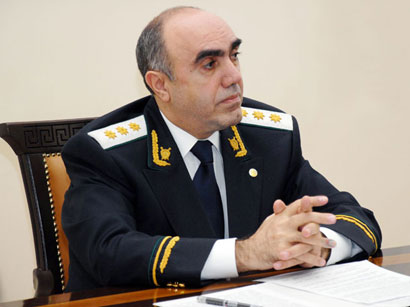
The Editor-in-Chief of Qaynar.info, Zahir Azamat, was called to the Prosecutor General’s Office, where he was met by the First Deputy Prosecutor General Rustam Usubov. The reason for the summons was the website’s coverage of the protests held in various regions of Azerbaijan.
Zahir Azamat received a letter from the Prosecutor General’s Office on January 28, stating: “The Azerbaijani Press Council has submitted the results of its January 2016 monitoring of several internet information resources including the Qaynar.info website, of which you are the director, to the Prosecutor General’s Office for a legal assessment. You are invited to come to the Prosecutor General’s Office (7 N.Rafibayli Street, Baku) on January 28, 2016, at 11.00am. Your presence is required following our investigations.”
“I was told at the Prosecutor’s Office that the Azerbaijani Press Council had submitted materials on the results of its monitoring of certain Internet information resources including the Qaynar.info website. Surprisingly, neither our editorial office, nor the official website of the agency had any information about this monitoring.
I was received by Rustam Usubov. I understood from the conversation that I had been summoned due to the articles on the protests in the regions published on Qaynar.info. The monitors alleged that the news stories that we had disseminated were unfounded, that the photos and videos were not verifiable, and that we had used older photos and videos. The Press Council claims that no protests took place. Although those news stories, photos and videos have been published multiple newspapers, websites, the Prosecutor General’s Office has only been tasked with conduct a legal assessment of certain websites. I have learned that along with us, basta.info and arqument.az have also been accused of legal violations,” said the Editor-in-Chief.
“Since the Press Council is a non-governmental organization, this issue lies beyond its competence. If the news stories were unfounded, they should have contacted us directly, and we would present the appropriate proof. Secondly, we only published true facts. The fact that the Press Council has repeatedly reported us to the Prosecutor General’s Office in the past two months is an indication of bias,” declared Azamat.
On January 29, the Directors of two more websites, Independent Information Agency (Mia.az) and Journalist Research Center (JAM.az), were invited to the Prosecutor General’s Office. Officials demanded that they, along with Azamat, cease publication of allegedly unreal, biased and libelous information. They were warned that if they continued to publish such information, they would face much stricter measures, as prescribed by law.
The Prosecutor General’s Office has issued a statement on this matter: “Investigations conducted by the Prosecutor General’s Office have revealed that a number of websites have grossly violated the requirements of articles 10 (Prohibition of abuse of freedom of mass media) and 11 (Special cases where dissemination of information or disclosure of the source of information is not permitted) of the Law on Mass Media in that they disseminated information about the actions organized and held by separate individuals in various regions of the country. This information misrepresented the protests as [evidence of] the alleged deterioration of the socio-economic situation in the country and public dissatisfaction with the existing situation, and demonstrated an openly provocative position by failing to verify the information or learn the official position of state authorities. In some cases, in those news reports, the dates of next actions planned in Baku and other regions of the country were announced, [constituting] attempts to incite mass riots; separate officials were accused of serious crimes, and untrue and defamatory information was spread about various government agencies and their leaders.”
Background: The first two weeks of January witnessed protests across various regions of the country (Siyazan, Fuzuli, Lankaran, etc.). The protests were sparked by the increase in the prices of food products and other essential goods, and closure of various places of work following the dramatic devaluation of the national currency in 2015.

